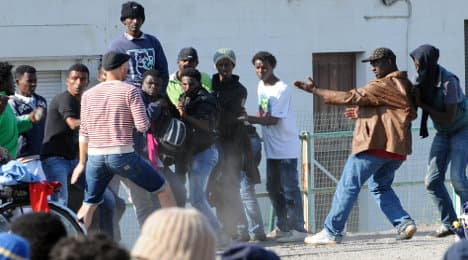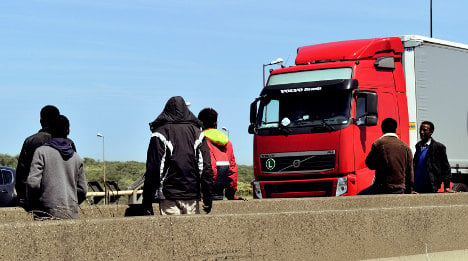Calais: 'People will be killed if nothing is done'

With migrants fighting running street battles in the port of Calais, The Local speaks to Jean-François Corty from the humanitarian group Medecins du Monde, who says the crisis is worsening and it's only a matter of time before people are killed.
Just how bad is the situation in Calais?
I’ve been working in Calais for the last seven years and this is the worst we have had to face.
What has caused the outbreaks of violence between migrants?
Basically there’s so many people trying to get onto the trucks [to get to across the Channel to the UK] they are fighting over the best places to do that and there’s so few of them. This is not ethnic violence. There are huge numbers of migrants living in the same place and the pressure builds up. They have nothing to lose. It’s a very worrying situation. We will see more fights and we will have deaths. That is a certainty.

Why has the situation deteriorated so badly?
In the last few weeks there has been has been a large increase in the number of refugees coming here, mostly from Eritrea, Sudan, Syria and Afghanistan. Currently there’s around 1,000 to 1,500 refugees living on the streets of Calais. Every week we see 200 – 300 more. There’s huge pressure because of the restrictions on where they can live. Camps have been dismantled by police but there is no alternative accommodation provided for them.
What is the situation like for the migrants?
We face a situation at the moment where families, pregnant women and children are living on the streets without any assistance from authorities. They have problems even accessing clean water, because a few water pumps which were open just two months ago have now been turned off. They also have problems finding food. There’s currently around three to four big camps that have been set up on industrial estates, near chemical plants, close to the sea.
What are the French authorities doing to ease the crisis?
They don’t want to provide help because they don’t want to send out the message to the world that this place is a place where people can come. They are only focussed on stopping crime and are not responding to basic needs. The police have the means to destroy camps but they are not responding to the reality of the needs on the ground. Organisations like ours are trying to do what we can, like provide sleeping bags, clean water and basic health treatment, but it’s impossible to cover all the needs. It’s become more and more difficult to provide assistance.

What needs to be done?
The message needs to be given to the migrants that they can have rights in France, because most of them think they can have better access to rights in the UK. The authorities here do not tell them about how to access rights in France. It would also be a good idea for the French authorities to ask the UNHCR [United Nations High Commission for Refugees] to come to Calais and take a look. They have experience in these matters and it would be good to get their assessment. I’m not saying they need to build a refugee camp, but just to make some recommendations. The authorities also need to work with the UK and with Italy, where most migrants arrive, to find a solution in the long term. They need to accept that the wars and unrest in East Africa will not stop in the short term.
SEE ALSO: Calais Migrants - France needs a new policy
What about building a new centre like Sangatte?
The problem with Sangatte was that it was difficult to manage because of the mafia and criminals there. It would be possible to manage a refugee centre on a smaller scale, that would prioritise young women and children and young boys who need a rest after travelling across Europe. At the moment the situation doesn’t work. There’s not enough lodgings available to refugees in France. When the camps are destroyed the are sent to temporary detention centres around France, but after two or three days they are released and return to Calais.
Comments
See Also
Just how bad is the situation in Calais?
I’ve been working in Calais for the last seven years and this is the worst we have had to face.
What has caused the outbreaks of violence between migrants?
Basically there’s so many people trying to get onto the trucks [to get to across the Channel to the UK] they are fighting over the best places to do that and there’s so few of them. This is not ethnic violence. There are huge numbers of migrants living in the same place and the pressure builds up. They have nothing to lose. It’s a very worrying situation. We will see more fights and we will have deaths. That is a certainty.

Why has the situation deteriorated so badly?
In the last few weeks there has been has been a large increase in the number of refugees coming here, mostly from Eritrea, Sudan, Syria and Afghanistan. Currently there’s around 1,000 to 1,500 refugees living on the streets of Calais. Every week we see 200 – 300 more. There’s huge pressure because of the restrictions on where they can live. Camps have been dismantled by police but there is no alternative accommodation provided for them.
What is the situation like for the migrants?
We face a situation at the moment where families, pregnant women and children are living on the streets without any assistance from authorities. They have problems even accessing clean water, because a few water pumps which were open just two months ago have now been turned off. They also have problems finding food. There’s currently around three to four big camps that have been set up on industrial estates, near chemical plants, close to the sea.
What are the French authorities doing to ease the crisis?
They don’t want to provide help because they don’t want to send out the message to the world that this place is a place where people can come. They are only focussed on stopping crime and are not responding to basic needs. The police have the means to destroy camps but they are not responding to the reality of the needs on the ground. Organisations like ours are trying to do what we can, like provide sleeping bags, clean water and basic health treatment, but it’s impossible to cover all the needs. It’s become more and more difficult to provide assistance.

What needs to be done?
The message needs to be given to the migrants that they can have rights in France, because most of them think they can have better access to rights in the UK. The authorities here do not tell them about how to access rights in France. It would also be a good idea for the French authorities to ask the UNHCR [United Nations High Commission for Refugees] to come to Calais and take a look. They have experience in these matters and it would be good to get their assessment. I’m not saying they need to build a refugee camp, but just to make some recommendations. The authorities also need to work with the UK and with Italy, where most migrants arrive, to find a solution in the long term. They need to accept that the wars and unrest in East Africa will not stop in the short term.
SEE ALSO: Calais Migrants - France needs a new policy
What about building a new centre like Sangatte?
The problem with Sangatte was that it was difficult to manage because of the mafia and criminals there. It would be possible to manage a refugee centre on a smaller scale, that would prioritise young women and children and young boys who need a rest after travelling across Europe. At the moment the situation doesn’t work. There’s not enough lodgings available to refugees in France. When the camps are destroyed the are sent to temporary detention centres around France, but after two or three days they are released and return to Calais.
Join the conversation in our comments section below. Share your own views and experience and if you have a question or suggestion for our journalists then email us at [email protected].
Please keep comments civil, constructive and on topic – and make sure to read our terms of use before getting involved.
Please log in here to leave a comment.